An Introduction to Agriculture Post Peak Petroleum
71% of the petroleum consumed in the
If you’ve read the July 2004, Harper’s Magazine article entitled “The Oil We Eat” by Richard Manning or Dale Allen Pfeiffer’s article “Eating Fossil Fuels” you probably have an even better understanding of the extent to which or food production system is based on fossil fuels especially oil. If you haven’t read them you should.
So if we know that the chemicals we use to fertilize our soils are going to become more scare and more expensive and if we understand that the labor of plowing and planting and producing our food will no longer be accomplished in the future by machines powered by petroleum and if we recognize that the idea of transporting food from far flung corners of the globe will not be possible in an era of increase fuel prices what are we going to do about it?
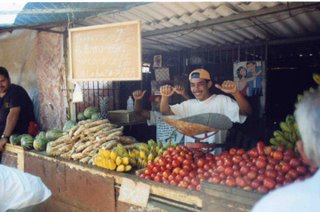 The caloric intake rate among Cubans has returned to a level near that of the late 80’s. By the way their infant mortality rate is now just slightly better than that of
The caloric intake rate among Cubans has returned to a level near that of the late 80’s. By the way their infant mortality rate is now just slightly better than that of
How about here in the
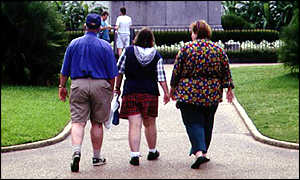 That’s kind of an amusing question to some extent but what would our children look like 30 pounds lighter? How well would they be nourished with out all the fresh
That’s kind of an amusing question to some extent but what would our children look like 30 pounds lighter? How well would they be nourished with out all the fresh
Let’s tackle these issues one at a time. I mentioned 31 percent of fossil fuel inputs in agriculture are used to created inorganic fertilizers. The solution to overcoming this dilemma is a return to the cyclic patterns that governed agricultural production before man harnessed the power of petroleum. Prior to cheap commercial fertilizers farmers relied on composted nutrients to build soil and produce crops. Kitchen waste, yard waste, animal manure and green manure or composted crops are all part of a possible return to a system that employs what some consider waste and returns to nature the rubbish we currently dump in our landfills. I watch people put trash bags full of organic material- leaves and grass clipping out at the street for the city to take and dump in the landfill and I wonder if they understand the amount of nutrients they could be returning to the soil. In former times humans utilized the slight excesses of these systems to produce food for themselves. The so called “green revolution” of the 50’s and 60’s substituted dependency on stewardship of these systems for dependency on chemicals likely to run short in the near future. We must go back to a pattern of returning theses nutrients to the soil. We must follow the cycles of flow not the linear pattern of input. We must compost like crazy.
Next we have to deal with the issue of mechanized labor. In 1920 just over 30% of the population if the United States of
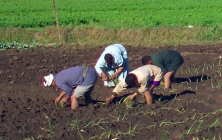 I fully expect to a certain extent a return of human labor to the task of producing food. Perhaps those who currently push paper for a living will find themselves unexpectedly involved in future food production. I think animals will once again play a part in how we prepare for the task of raising crops. Animals come with their own share of needs and required care but they also reproduce.
I fully expect to a certain extent a return of human labor to the task of producing food. Perhaps those who currently push paper for a living will find themselves unexpectedly involved in future food production. I think animals will once again play a part in how we prepare for the task of raising crops. Animals come with their own share of needs and required care but they also reproduce.
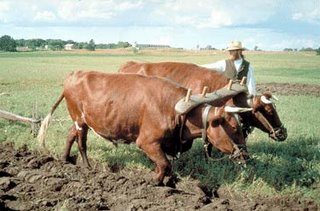 Oxen have babies, tractors don’t. They also recycle food into manure that works well as a fertilizer. This arrangement is profitable even for the backyard gardener. I have 3 chickens despite my limited amount of property and close proximity to our downtown. My hens provide my growing family with fresh, chemical free eggs and they recycle my uneaten food into wonderful composted fertilizer for the garden. They eat bugs and are fun to watch but raising urban chickens is a topic for another day. Suffice to say that animals of all kinds have been and will again be used to store energy and recycle nutrients humans are unable to process. Green manures or composting cover crops are another way to build soil without using chemical fertilizers. Growing plants that stabilize unused soils and fix nitrogen from the air that can then be turned back into the soil to replenish the nutrients lost is a great way to naturally build fertility.
Oxen have babies, tractors don’t. They also recycle food into manure that works well as a fertilizer. This arrangement is profitable even for the backyard gardener. I have 3 chickens despite my limited amount of property and close proximity to our downtown. My hens provide my growing family with fresh, chemical free eggs and they recycle my uneaten food into wonderful composted fertilizer for the garden. They eat bugs and are fun to watch but raising urban chickens is a topic for another day. Suffice to say that animals of all kinds have been and will again be used to store energy and recycle nutrients humans are unable to process. Green manures or composting cover crops are another way to build soil without using chemical fertilizers. Growing plants that stabilize unused soils and fix nitrogen from the air that can then be turned back into the soil to replenish the nutrients lost is a great way to naturally build fertility.
Lastly we must recognize the great distance most of our food travel to meet us. This is what I believe is the most readily fixable problem within our current food production system. The idea that we in
In 1943 Americans took food production out into their own backyards. The nation’s population that year boasted 20 million
The closet possible food producer is of course you. Home gardening can be extremely productive and provide food at incredibly savings even in our current price structure.
 The ability to produce some or much of what you need to eat is an incredible form of freedom. It empowers a household to begin reusing its compostable waste, it cause the family cultivate a closer connection with natural systems and it unplugs those willing to garden from the current agricultural system that has put in place a dependency on fossil fuels bound to cause us problems in the future post peak oil. In other words Monsanto take a hike.
The ability to produce some or much of what you need to eat is an incredible form of freedom. It empowers a household to begin reusing its compostable waste, it cause the family cultivate a closer connection with natural systems and it unplugs those willing to garden from the current agricultural system that has put in place a dependency on fossil fuels bound to cause us problems in the future post peak oil. In other words Monsanto take a hike.
Community gardens are the next closest food production cycle. They make use of cleared land and available sunlight to increase the amount of food producible in given area. Shared work and responsibility can be reward in ways that exceed crop yields. Much can be learned from others.
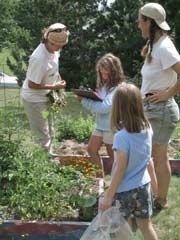 I am in the process of fostering a new garden in my community and I have been surprised at who has come out of the wood work with great gardening knowledge or at least great enthusiasm. It is a reason for somewhat separate individuals to come together for a common cause. I hope this is even more true in the future.
I am in the process of fostering a new garden in my community and I have been surprised at who has come out of the wood work with great gardening knowledge or at least great enthusiasm. It is a reason for somewhat separate individuals to come together for a common cause. I hope this is even more true in the future.
Slightly further from the consumer is the local food producers who are most likely farmers whose sole employment it is to grow food. They will again thrive on the edges of urban or semi-urban areas. Those with the land and know-how to grow crops without artificial energy inputs will be in great demand.
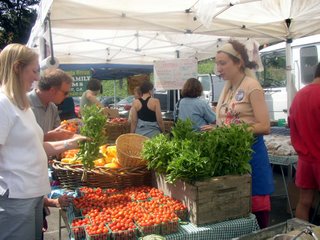 In
In
Outside of local farmers I think we will continue regional production of crops well suited to our climate. And an additional step further beyond that I think national and international food trade will continue in ever-decreasing amount. In the future I think the large majority of what we consume will come from a fairly small radius.
Have you ever boiled a frog? If you drop it into water 212 degrees Fahrenheit the frog will obviously protest and try its best to get out of the pot. If however you place the frog in lukewarm water and very slowly turn up the temperature the frog will eventually roll its eyes back into its head and die. Why such a horrible story in the middle of me presentation you ask?
The
Normally after I’m finished talking people will ask me, “So what are we suppose to do”?
First, educate yourself. Don’t believe everything anyone says even me. Read, go online, pay attention to where your food really comes for, listen to others, educate yourself.
Second, grow your own food and by that I don’t mean try and provide all your family’s calories this year. You overload trying to do that. But pick a few things to grow- a couple of tomatoes, peppers, some potatoes… m maybe some beans and learn and increase each year. The important thing is to get started. Start small and dream big. But start now.
Third, work towards a community garden. Look for unused sunny property and neighbors who might be willing to help. There are resources online and maybe in your community already. Get together with neighbors and build an effort to grow food.
Forth, support your local farmers. You can do that by visiting the farmers market looking into CSA (community…) joining your local food cooperative. Try asking you local restaurant if they buy from local food producers- put the bug in their era that you as a patron are interested in that. Ask your waitress for a chicken bag and tell her that your unrecognizable leftovers will be taken home and composted by your very own chickens. I promise you’ll get a reaction.
Lastly don’t rely on others as the only ones to provide your basic needs. You might not want to become a farmer or a chicken rancher or a rainwater collection specialist but understand the basics of how to take care of yourself, your family, your friends and the environment around you. This return to responsibility will I believe be the beginning of a better tomorrow.
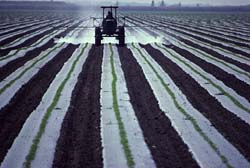
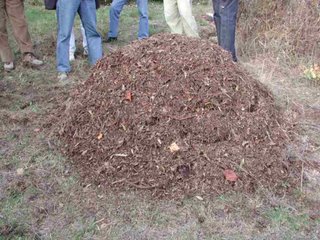


4 comments:
Great summary of the issues. Thanks for the inspiration.
a generally excellent article but do you really believe that the Cuban infant mortality is better than the US infant mortality rate? Rather than just accept and repeat that 'fact' I would hope that as a journalist, you would check it out a little further. Do they count an infant as 500 grams or 24 weeks or what? If you saw the conditions of their hospitals you would be amaized and disgusted. Since you made the claim about Cuban infant mortality being better than the US could you please back that up with data? Also, although Americans live a very unhealthy lifestyle could you please show is the data on comparable Cuban longevity? or do you just accept what the Cuban government tells you? A final question for all who are enthralled by Che, how many people, many innocent by his own admission, did he personally execute and how many did he order killed by subordinates? Are those murders in the Cuban statistics or 'overlooked'? Thankyou for the otherwise excellent article and I look forward to the courtesy of your response, robin appleby M.D.
i have addressed this comment in a post entitled "can you learn something from anything?"
http://poweringdown.blogspot.com/2006/04/can-you-learn-something-from-anything.html
good post :)
Post a Comment